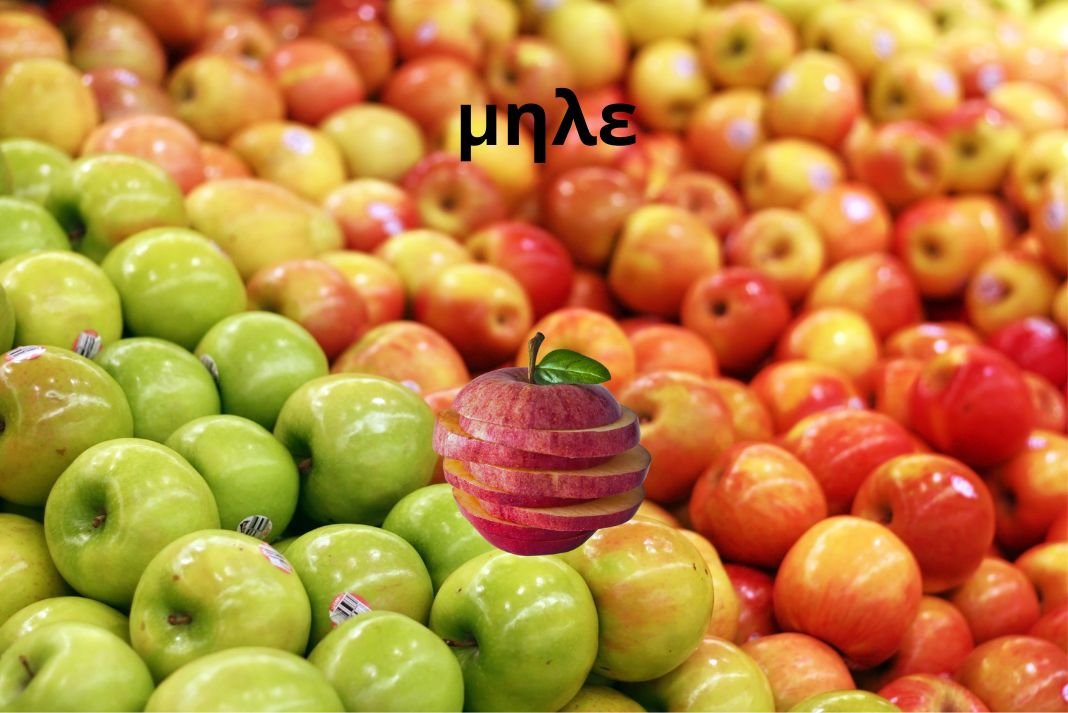Apples, μηλε in Greek, are a gateway to a world steeped in history, culture, and culinary marvels. Apples first made their mark on human civilization when they originated from Central Asia’s lush regions and transmogrified themselves into staples of modern kitchens from wild fruits. This blog post delves into the captivating odyssey of apples, revealing their rich heritage, nutritional benefits, varied types, and limitless applications.
Table of Contents
Origins of Apples: A Fruit with Ancient Roots
Ancient records indicate that apples have been grown for thousands of years. They were first cultivated in Central Asia’s nutrient-rich lands, where the Malus sieversii was the progenitor of the contemporary apple, which still thrives there as a wild fruit. Eventually, apples spread across trade routes and conquests, becoming a precious fruit in various societies.
Greeks and Romans played vital roles in cultivating apples. They created multiple varieties and developed grafting methods that ensured constant quality and taste. Apples were not just food but also represented knowledge, temptation, and immortality in many myths and tales.
Eventually, it arrived in Europe, where it became both a dietary staple and a symbol of prosperity. It was necessary for survival during harsh winters because it could be stored over long periods, hence cementing its position within European cuisine and culture.
From Orchard to Table: The Evolution of Apple Cultivation
Apples grow best under conditions characterized by moderate temperatures and well-defined seasons. The most suitable conditions include loamy soil with good drainage capacities; pH levels should range from slightly acidic to neutral. Getting healthy trees that produce high-quality fruits requires successful planting and grafting techniques.
Early settlers introduced apple varieties into America in the 1600s. The planting of Boston’s first orchard in 1625 marked the beginning of widespread apple cultivation across North America. Pioneers like Johnny Appleseed contributed to spreading apple trees all over the USA, leading to the diversified varieties available today.
Nowadays, innovative farming using agricultural science has led to improved apple yield and quality. People are increasingly adopting integrated pest management (IPM) and organic farming methods that target sustainability and reduce environmental impact.
A World of Flavors: Exploring Apple Varieties
Apples come in numerous varieties, each with distinctive flavors and uses. However, such popular ones like the Red Delicious, Granny Smith, and Golden Delicious are just the tip of the iceberg when it comes to μηλε.
To experience something different, Bramley apples, famous for their cooking qualities, are from the UK. Their tartness makes them perfect for pies or sauces, and they hold their shape and taste when cooked. On the other hand, Honeycrisp is loved by many because of its fantastic crunchiness and balance of sweetness, making it an ideal choice for snacking.
These also include heritage types such as Ashmead’s Kernel and Esopus Spitzenburg, which offer intricate flavors along with historical value. These varieties are often less commonly available commercially, making them precious among apple enthusiasts and home gardeners.
Nutritional Powerhouse: Health Benefits of μηλε
Delicious apples also contain nutrients that keep us healthy. A single apple provides much-needed vitamin C, which strengthens our immune system. Vitamin K in apples supports bones, while B vitamins help convert food into usable energy through metabolism.
Apples, being abundant in minerals such as potassium, help regulate heart health and maintain normal blood pressure. They also contain a high amount of dietary fiber, which facilitates digestion and probably promotes weight management.
Substances such as quercetin and flavonoids, among other antioxidants present in apples, are anti-inflammatory and could hence lessen the chance of chronic diseases. Regular consumption of apples has been associated with reduced risk of cardiovascular illnesses, diabetes, and some types of cancers.
Cooking Magic Using Apples
Apples’ usefulness in the kitchen cannot be underestimated due to their versatility. They can be used for many things, from making sweet cakes to savory dishes, to add taste and nutrition. For example, they can be used to prepare a classical apple pie, tangy apple cider, or refreshing apple salad, adding variety to any meal.
Moreover, for baking purposes, they serve as good natural moisteners and sweeteners for bread, cakes, muffins, etc. They can also be caramelized into a decadent dessert or blended into smoothies during breakfast time. This has made them an all-time favorite ingredients among top chefs and home cooks.
Besides flavor combinations in cooking, using apples can create some unexpected tastes. For instance, when combined with spices like cinnamon nutmeg cloves, it increases the sweetness, while the addition of citrus gives it a more vibrant character.
Apple Cider Vinegar: A Versatile Health Elixir
It is no wonder that numerous traditional healing recipes include apple vinegar, which is produced out of fermented μηλε (an ancient Greek word for apple). One known benefit includes improving the digestion mechanism, leading to weight reduction goals. It’s believed that consuming diluted mixtures of water mixed with this product before meals may reduce hunger pangs, at least acting as a digestive stimulant.
Additionally, apart from promoting personal well-being, it helps protect the environment since it delivers mild household detergents, cleaning agents, or even insecticides devoid of hazardous chemicals. Due to its antimicrobial characteristics, it can also be used as a bathwater addition or skin toner. It is one of the many examples of Apple’s versatility outside cooking.
Festivals and Celebrations Honoring the Apple
Globally, various apple festivals commemorate the μηλε’sμηλε’s cultural significance. They enhance local economies through tourism while at the same time providing educational opportunities on apple farming and uses. Typical activities during these festivals include apple picking, cider tasting, and cooking demonstrations that foster a sense of community.
Among them is the National Apple Harvest Festival held in Pennsylvania, USA, which is well known for attracting individuals from all over to celebrate the apple harvest. Similarly, Apple Day in the UK promotes apple diversity and heritage, encouraging people to learn more about and appreciate different varieties.
These events also underscore apples’ significance in our daily lives, thus underscoring their role in cultural traditions and economic importance. They offer platforms for farmers, artists, or zealots who want to express their affection for this extraordinary fruit species.
The Significance of Apples in Symbolism and Mythology
Apples have been prominent figures both symbolically and mythologically speaking. Greek folklore caused the Trojan War when Eris threw an apple labeled ‘the fairest’; this implied how attractive a fruit like an apple could be, leading to massive destruction because of its power. In Norse mythology, apples were linked with immortality and eternal youth.
In the Christian belief system, the forbidden fruit is actually shown as an apple that grew within Paradise, portraying both temptation and knowledge. Consequently, apples have persisted through art, literature, and popular culture, hence becoming a strong symbol in diverse scenarios.
These symbolic meanings add layers of depth to our understanding of μηλε, connecting the fruit to broader themes of desire, wisdom, and life. Exploring these stories enriches our appreciation of apples and their place in human history.
Reinventing Apple Cultivation: The Future
Innovation will be a key factor in shaping apple cultivation. Climate change has been devastating for traditional apple-growing regions because it impairs both quality and yield. However, solutions are available thanks to advancements made by agriculture technology in this regard.
Breeding programs are developing new varieties of apples that can withstand climate change and resist pests. Precision agriculture has also embraced new trends, like using drone monitoring or automated irrigation systems, thereby boosting efficiency and sustainability within apple orchards.
The future of apple farming is shaped by consumers’ interest in organic and locally produced foods. Farmers have had to adopt sustainable practices to meet the demands that come with such choices, ensuring that apples continue to be popular among upcoming generations.
A Journey through Culture Apples Touching Lives
Apples have influenced our culture intensely over time. From ancient Greeks to present-day celebrations, they symbolize knowledge, temptation, and wealth. Their versatility across different culinary traditions, together with their nutritional properties, make them a dietary staple globally.
μηλε’s story continues to prove how attractive apples are as fruits. They thrive in different climates, cuisines, and cultures, thus making them very important in our lives. By embracing this fruit, we carry on an enduring legacy that has been around for hundreds of years.
Conclusion: Growing the Legacy of μηλε
μηλε takes us through history, culture, and food delightfully woven together from past eras into modern kitchen tablecloths. Beyond just a fruit category, Elixir refers not only to what brings us closer to Mother Earth but also to what leads us towards acquiring knowledge, thus attaining good health status.
As we continue to explore and innovate, the significance of apples in our lives remains as strong as ever. Apples can be used as fresh fruit, cooking ingredients, or even fermented, making them the most versatile food item.
Let’s raise a glass to μηλε’s memory. Discover the countless varieties, enjoy their flavors, and listen to the stories that make apples so beloved in our world. Also, if you would like to know more about this incredible fruit, please subscribe to our monthly newsletter and keep in touch with all apple-related matters via email.

